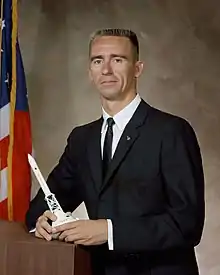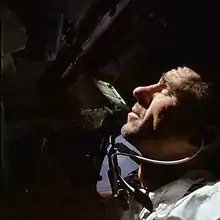Walter Cunningham
Ronnie Walter Cunningham (born March 16, 1932), (Col, USMCR, Ret.) is a retired American astronaut. In 1968, he was a Lunar Module Pilot on the Apollo 7 mission. He was NASA's third civilian astronaut (after Neil Armstrong and Elliot See), and has also been a fighter pilot, physicist, entrepreneur, venture capitalist, and author of The All-American Boys. Following the deaths of Donn F. Eisele in 1987 and Wally Schirra in 2007, Cunningham is the last surviving crew member of Apollo 7.
Walter Cunningham | |
|---|---|
 | |
| Born | Ronnie Walter Cunningham March 16, 1932 Creston, Iowa, U.S. |
| Status | Retired |
| Nationality | American |
| Other names | Walter Cunningham |
| Alma mater | Santa Monica College, A.S. 1958 UCLA, B.A. 1960, M.A. 1961 |
| Occupation | Fighter pilot, physicist |
| Awards | |
| Space career | |
| NASA Astronaut | |
| Rank | |
Time in space | 10d 20h 08m |
| Selection | 1963 NASA Group 3 |
| Missions | Apollo 7 |
Mission insignia | |
| Retirement | August 1, 1971 |
Biography
Early life, education and military career
Cunningham was born in Creston, Iowa, on March 16, 1932.[1] He graduated from Venice High School in Los Angeles, California, in 1950.[1][2]
After high school, Cunningham studied at Santa Monica College,[3] until he joined the U.S. Navy in 1951, and began flight training in 1952. He served on active duty as a fighter pilot with the U.S. Marine Corps from 1953 until 1956, flying 54 missions as a night fighter pilot in Korea. Armistice discussions were still on-going when Cunningham initially left for Korea, and the Korean Armistice Agreement was signed just before he arrived.[4] From 1956 to 1975, he served in the Marine Corps Reserve, ultimately retiring at the rank of colonel.[1]
Following his active duty, he resumed his studies at Santa Monica College, before transferring to the UCLA in 1958.[3] Cunningham received his BA with honors in 1960, and his MA with distinction in 1961, both in physics, from the University of California, Los Angeles. He completed all requirements save for the dissertation for a PhD in physics at UCLA during his time at RAND Corporation, where he spent three years prior to his NASA selection.[1]

NASA career
In October 1963, Cunningham was one of the third group of astronauts selected by NASA. On October 11, 1968, he occupied the Lunar Module Pilot seat for the eleven-day flight of Apollo 7, the first launch of a manned Apollo mission.[1] The flight carried no Lunar Module and Cunningham was responsible for all spacecraft systems except launch and navigation. The crew kept busy with myriad system tests and successfully completed test firing of the service-module-engine ignition and measuring the accuracy of the spacecraft systems.[5] Schirra, with a cold, ran afoul of NASA management during the flight, but Cunningham went on to head up the Skylab Branch of the Astronaut Office and left NASA in 1971.[6][1]
He has accumulated more than 4,500 hours of flying time, including more than 3,400 in jet aircraft and 263 hours in space.[1]
Post-NASA career
In 1974, Cunningham attended Harvard Business School's six-week Advanced Management Program and later worked as a businessman and investor in a number of private ventures.[1] In 1977, he published The All-American Boys, a reminiscence of his astronaut days.[7] He was also a major contributor and foreword-writer for the 2007 space history book In the Shadow of the Moon.[8] In 2018, Cunningham joined the Back to Space organization as an Astronaut Consultant with the goal of inspiring the next generation to go to Mars.[9]
In 2008, NASA awarded Cunningham the NASA Distinguished Service Medal for his Apollo 7 mission.[10] He is currently a radio talk show host and public speaker. Cunningham also works as a consultant to start-up technology companies and is chairman of the Texas Aerospace Commission.[1]
Global warming views
Cunningham rejects the current mainstream opinion regarding anthropogenic global warming (AGW). In 2010, he published a discussion paper titled "Global Warming: Facts versus Faith". In an editorial published in the Houston Chronicle on August 15, 2010, Cunningham argued that the empirical evidence does not support the claims of global warming.[11]
Organizations
Cunningham is a member of numerous organizations. He is an associate fellow of the American Institute of Aeronautics and Astronautics, fellow of the American Astronautical Society, member of the Society of Experimental Test Pilots, American Geophysical Union, Explorers Club, Sigma Pi Sigma and Sigma Xi, Association of Space Explorers, Houston American Revolution Bicentennial Commission, Aviation Subcommittee, Houston Chamber of Commerce, Earth Awareness Foundation, National Association of Small Business Investment Companies.[12][1]
Awards and honors
Cunningham is a recipient of numerous national and international honors, including:
- NASA Distinguished Service Medal[1]
- NASA Exceptional Service Medal[13]
- AIAA Haley Astronautics Award, 1969[1]
- UCLA Professional Achievement Award, 1969[1]
- Special Trustees Award, National Academy of Television Arts and Sciences (Emmy Award), 1969[1]
- Medal of Valor, American Legion, 1975[1]
- Outstanding American Award, American Conservative Union, 1975[1]
- Listed in Who's Who[1]
- George Haddaway Award, 2000[1]
- Houston Hall of Fame[1]
- International Space Hall of Fame, inducted in 1983[14]
- U.S. Astronaut Hall of Fame, inducted in 1997[15]
- Iowa Aviation Hall of Fame, inducted in 2003[1]
- International Air & Space Hall of Fame, San Diego Air and Space Museum, inducted in 2011.[1]
See also
References
- "Biographical Data: Walter Cunningham NASA ASTRONAUT (FORMER)" (PDF). NASA. July 2014. Retrieved January 16, 2021.
- Walter Cunningham ~ 1950
- Famous SMC Alumni Set Forth a Path of Excellence to Follow
- Interview at USC Institute for Creative Technologies, June 21, 2018
- "Lunar Module pilot on Apollo 7, the first launch of a manned Apollo mission". New Mexico Museum of Space History. Retrieved December 16, 2016.
- Wade, Mark. "Apollo 7". Encyclopedia Astronautica. Archived from the original on October 12, 2008. Retrieved December 16, 2016.
- Cunningham, Walter; Herskowitz, Mickey (1977). The All-American Boys. New York: Macmillan Co.
- "In the Shadow of the Moon". University of Nebraska Press. Retrieved December 16, 2016.
- "Back To Space | The Team". Back To Space. February 5, 2018. Retrieved July 24, 2018.
- "First Apollo flight crew last to be honored". collectSPACE. October 20, 2008. Retrieved October 20, 2008.
- Cunningham, Walter (August 15, 2010). "Climate change alarmists ignore scientific methods". Houston Chronicle. Retrieved April 3, 2012.
- "Walter Cunningham's memberships". Walter Cunningham. Retrieved December 14, 2016.
- "'Feisty' Schirra Apologizes". The San Francisco Examiner. San Francisco, California. November 3, 1968. p. 28 – via Newspapers.com.
- Sheppard, David (October 2, 1983). "Space Hall Inducts 14 Apollo Program Astronauts". El Paso Times. El Paso, Texas. p. 18 – via Newspapers.com.
- Meyer, Marilyn (October 2, 1997). "Ceremony to Honor Astronauts". Florida Today. Cocoa, Florida. p. 2B – via Newspapers.com.
Further reading
- Cunningham, Walter (1977). The All-American Boys. MacMillan Publishing Company. ISBN 0-02-529240-4.
- French, Francis and Colin Burgess (2007). In the Shadow of the Moon: A Challenging Journey to Tranquility. University of Nebraska Press. ISBN 978-0-8032-1128-5.
External links
| Wikimedia Commons has media related to Walter Cunningham. |